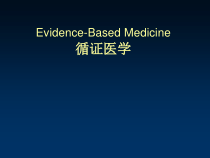 PPT
PPT
【文档说明】循证医学的临床应用课件.ppt,共(63)页,2.721 MB,由小橙橙上传
转载请保留链接:https://www.ichengzhen.cn/view-254969.html
以下为本文档部分文字说明:
Evidence-BasedMedicine循证医学Evidence-basedPractice(EBP)Models•TraditionalpracticeModel(×)•Model1:Usethehighestqualityinformationtoguideclin
icaldecisions•Model2:Search,evaluate,andmakeavailablespecialtyspecificbestavailableevidence•Model3:Cr
eateoriginalresearchorsystematicreviewsEBMPractice-FivestepsPatientHistoryandPE……•QuestionAskingAnswerableClinicalQuestions.
•SearchSearchingforthebestcurrentevidence.•AppraiseCritically-appraisingtheevidence.•Application:Integratingth
eevidencewithourexpertiseandourpatient’suniquebiologyandvalues•AuditEvaluatingourperformanceStep1AskingAnswerableClinicalQuestions•EBMstartswit
haclearclinicalquestion•Well-builtclinicalquestionsguidethewholeEBMprocess•Typeofquestion?–Causation/etiology–Intervention–Diagnosis–Prognos
is•TypeofStudy?–Whatwouldbethebeststudydesigninordertoanswerthequestion?–studydesignsshouldlimitbiasStep1AskingAnswerableCl
inicalQuestions•Questioncomponents:PICO–WhattypesofParticipants?–WhattypesofInterventions?–WhattypesofComparison?–WhattypesofOutcomes?Step1AskingAn
swerableClinicalQuestions•Whattypesofparticipants?–Diseaseorconditionofinterest–Potentialco-morbidity–Setting–Demographicfa
ctors–TaskofclinicalproblemStep1AskingAnswerableClinicalQuestions•Whattypesofintervention?–Typesoftreatment–Type
ofdiagnostictest–Typeofcausativeagent–TypeofprognosticfactorStep1AskingAnswerableClinicalQuestions•Whattypesofoutcomes?–Forcausation,out
comeisdisease–Fordiagnostictest,outcomeindiseaseofinterest–Fortreatmentincludealloutcomesimportanttopeoplemakingdecision
stodefinesuccessoftherapy–Forprognosis,outcomeisthechosenendpointofthediseaseStep1AskingAnswerableClinica
lQuestions•Broadornarrowquestions–Broad•Dogefinitibimprovesurvivalinlungadenocarcinoma?–Narrow•Dogefini
tibimprovesurvivalinfemallungadenocarcinomarefractorytofirst-linechemo?Step1AskingAnswerableClinicalQue
stions•Causation–People-Exposure-Comparison-Outcomes•Doesheavysmokerhavehigherincidenceoflungcancer?–Prognosis:People-Exposure
-Comparison-Outcomes•IslungadenocarcinomawithhighlevelofCEAaremorelikelytohaverecurrentdisease?Step2Searchingforthebestcurrentevidence•Textbook–An
nuallyrevised–Usehighlevelevidences–Withreference•Guidelines•CochraneLibrary•MedlineNationalGuidelineClearinghouse(http://w
ww.guideline.gov/)Step2Toomuch?•即使是小的问题也有相关指南Step2Step2CochraneLibrary•Advantage–highestqualityevidencewe’lleverhav
eontheeffectivenessofhealthcare•Disadvantage–notyetmanysystemicreviews–necessarilyomitsthenewesttreatmentStep2EBPModels•Traditi
onalpracticeModel(×)•Model1:Usethehighestqualityinformationtoguideclinicaldecisions•Model2:Search,evaluate,andmakeavailablespecialtyspecificLevel1
information•Model3:CreateoriginalresearchorsystematicreviewsStep2PubMed/MEDLINE•http://www.ncbi.nlm.nih.gov/PubmedStep2Medline-PubMedAdvan
tage–exhaustiveness,flexibilityofsearching–journalcoverage,currency(on-lineversions)–widespreadavailabilityandsupportDisadvantage–havetod
oyourownqualityfiltering–puttingtogethergoodsearchesisdifficult–gapsincoverage(medical,geographicalandlinguistic)Step2Step2Step2Step
2Step2Step2Step2Searchingforthebestcurrentevidence•Forprimaryliterature–Notjustabstract!–TrytogetFull-textStep3Critically-appraisingtheevidence•Valid
?–Designandmethodology:logical?–Sample–ExperimentorMeasure:carriedoutinasoundwayandConvincible?Follow-uprate?–Analysis–Co
nclusion–Ethical?•Importance?–Clinicalsignificance?–Cost-effective?•Applicable?–Willtheresultshelplocally
?Step3Critically-appraisingtheevidence•Quickscreeningbytitle,abstractandrelatemessage–Authors•Well-known?Pastrecord?Cre
ditable?–Institute•Competencetodothisstudy?Well-known?–Specialty•Hasorhadpublishedincorejournals?Yourpractice?Valuable?•GoforFull-textD
iscrimination?Rational?EBM?Step3Critically-appraisingtheevidenceTypeofQuestionSuggestedbesttypeofStudyTherapyRCT>cohort>casecontrol>caseserie
sDiagnosisProspective,blindcomparisontoagoldstandardEtiology/HarmRCT>cohort>casecontrol>caseseriesPrognosisCohortstu
dy>casecontrol>caseseriesPreventionRCT>cohortstudy>casecontrol>caseseriesClinicalExamProspective,blindcomparisontogold
standardCostEconomicanalysisRightmethodsiscrucialTheEvidencePyramidHierarchyofevidence:arrangesstudydesign
sbytheirsusceptibilitytobiasPrimaryResearchExperimentalobservationalSecondaryResearch•Forquantitativestudies•Forqualitativ
estudiesNoconsensusabouttherelativerigourofdifferentmethodsSystematicreviewStep3Critically-appraisingtheevi
denceImprovedsurvivalandsamplesizedControlSurvival(%)5%10%15%101,290394134151,894544208202,444676328252,9
26788374PhaseIIIRCTheadtoheadComparesurvivalAdequatesamplesizeStep3Critically-appraisingtheevidence•Measure
–Objective:Labtest,Radiology–Subjective:pain,symptoms•Endpoint–alternative:relieveofsymptom,shrinkoftumor–Gol
dStandard:prolongsurvivalStep3Critically-appraisingtheevidence•Conclusion–Basedonthedata?–New?•Updated?•Comparewithotherstudy
•And,Whatnext?Step3Critically-appraisingtheevidence•Attention!–Don’ttrustitjustbecauseitisfromabigboss,meta-analysis,RCT,orgu
ideline.–Evidenceshouldbeinconsistencewithknownmedicalscience(physiology,pathology,pharmacology,etc)Usageofscientificlanguageisnotnece
ssarilymeanscientificbasedScientificmethodscreditNotalltheevidencesarethesameimportanceHollingworth&Jarvik,Radiology2007;244:31-3
8Flowchartofcost-effectivenessateachlevelofTAhierarchyTechnicalPerformanceDiagnosticPerformanceDiagnosticImpactTherapeuticImp
actImpactonHealthStep4Application•Integratingtheevidencewithourexpertiseandourpatient’suniquebiologyandvalues–Yourquestion–Yourpatient–Yourexperti
se–Yourhospital–Howto……Step5Evaluatingourperformance•Follow-up•Evaluate–Thepatientsbenefit……?•Next……•……Oragainanother5steps•
CollectdataandwriteanarticleEBPModels•TraditionalpracticeModel(×)•Model1:Usethehighestqualityinformationtoguidec
linicaldecisions•Model2:Search,evaluate,andmakeavailablespecialtyspecificbestavailableevidence•Model3:Createoriginalresearchorsy
stematicreviewsSelectiveEBP•Maynotneedtocarryoutall5steps•1.AskingAnswerableClinicalQuestions.•X2.Searchingforthebestcurrentevidence.•X3.Critically-
appraisingtheevidence.•4.Application:Integratingtheevidencewithourexpertiseandourpatient’suniquebiologyandvalues•5.Evalu
atingourperformanceSelectiveEBP•3differentmodesofEBP–Searching&appraising•providesE-Bcare,butisexpensiveintimeandresources–Searchingonly
•much,quicker,andifcarriedoutamongE-Bresources,canprovideE-Bcare–Replicatingthepracticeofexperts•quicke
st,butmaynotdistinguishevidence-basedfromego-basedrecommendationsSelectiveEBP•EvenfullyEBM-trainedcliniciansworkinall3modes–Searching&appra
ising•fortheproblemsIencounterdaily.–Searchingonly•forproblemsIencounteronceamonth.–Replicating•forproblemsIencounteronceadecade(and
crossingmyfingers!).Case1•Male,ZSUProfessor,62yearsold•Smallcelllungcancer,limiteddisease,chemofor6cycleswithcom
pleteresponse–Medicaloncologist:prophylacticcranialirradiation(PCI)notimporvesurvival,andwithAE!–Radio-oncologist:PCIimprovesurv
ival,andtolerable•Question:Why?ShouldthepatientbegivePCI?Improvesurvival?Howmuch?Sideeffect?When?How?TextbookPublish20061.Chanc
eofSCLCbrainmet:50%-80%for2years2.1995,aMETA-analysis:SCLCwithCR,PCIimprove3yearsurvival15%-21%,butnotanalysisthecomplication3.Reducebrainmet
from30%→5%☆Conclusion:SCLCwithCR,PCIisrecommendafter2cyclesofchemoComplications?case1Guideline&SR•NC
CN–LungcancerandProphylacticcranialirradiation1–2002TheCochraneLibrary,Issue2•Prophylacticcranialirradiationsignific
antlyimprovessurvivalanddisease-freesurvivalforpatientswithsmallcelllungcancerincompleteremission.case1例1FromSec
ondarySource•PCIshouldstartearlyafterchemo•complications:–notRCT–2studyreportnodifferenceinmentalorneurologicaldi
sorder,butonlystudypartofthestudypatients,40%and60%(1995,1997)•N=300•N=314–InoneRCT(N=46),reportamentaldisorder(1997)case1PUB
MED•"CranialIrradiation"[MESH]ANDlungneoplasms[mh]•("CranialIrradiation/adverseeffects"[MESH]OR"CranialIrradiation/mortality"[ME
SH])ANDlungneoplasms[mh]☆25papers,3papersafter2006,onrelatepaper(level5)例1PUBMED•2009,JCOpeer-review•Com
plications•Mentalandneurological•Increasebyconcurrentchemoirradiation•Increaseindoselevel≥40Gy,nomore
than30Gy,recommend20Gy–SupportPCIinSCLClimiteddiseasewithchemoCR.例1Conclusion&Decision•PCIreducebrainmet,improvesurvival•WhenRT<30GY
,rarecomplications•Morebenefitthanharm•Recommendation:PCI,rightnowcase1EventsLikeThis……Sanlubabyformulamilkpowdercontami
natewithmelamine•Jul.16,2008–甘肃省卫生厅接电话报告,称今年该院收治的婴儿患肾结石病例明显增多,近几个月已达十几例,经了解均食用了三鹿牌配方奶粉。•Sept.11,2008–新华社报道:“高度怀疑”三鹿公司生产的三鹿牌婴幼儿配方奶粉受到
三聚氰胺污染。case2Sanlubabyformulamilkpowdercontaminatewithmelamine•Sept.17,2008国务院有关部门负责人和科学家–国家质检总局局长李长江:……共检验了109家企业的491批次产品,有22家企业的69个批次
的产品检出了三聚氰胺,检出不合格产品的企业约为20%……需要指出的是,这次被检出含有三聚氰胺产品的企业,不是所有批次的婴幼儿奶粉都有问题,比如,伊利、蒙牛、雅士利、施恩等企业被抽检的产品有几十个批次,
但有问题的只有几个批次。case2Sanlubabyformulamilkpowdercontaminatewithmelamine–卫生部陈竺部长:三聚氰胺……主要对膀胱和肾脏有影响,引发动物膀胱炎、膀胱结石、肾脏炎症等,但没有发现对
人类有致癌作用。婴幼儿食用……出现不明原因的哭闹、呕吐、发热、尿液混浊、血尿、少尿或无尿等症状,应立即就近到医疗机构筛查就诊。食用含有三聚氰胺的其他品牌婴幼儿奶粉,只有出现上述症状时,才需要立即到医院筛查就诊。–从2008年9月12日至17日8时,各地报告临床诊
断患儿一共有6244例。其中,4917例患儿症状轻微,生命体征稳定,正在进行院外随访治疗或已经治愈。现仍留院观察治疗患儿有1327人。所有临床诊断病历中,有158人发生过急性肾功能衰竭,占总病例数的2.5%。经有效治疗,目前158例重症患儿当中,已经有94人病情平稳或已经治愈出院。此外
,回顾性的调查发现有3例死亡病例,其中甘肃省有2名,浙江有1名,不包括在刚才提到的6244名诊断病例之中。case2TheEvidencePyramidHierarchyofevidence:arrangesstudydesignsbytheirsusceptibility
tobiasPrimaryResearchExperimentalobservationalSecondaryResearch•Forquantitativestudies•ForqualitativestudiesNoconsensusabouttherela
tiverigourofdifferentmethodsSystematicreviewSanlubabyformulamilkpowdercontaminatewithmelamine•Celloranimali
snoequaltohuman•Butthereareanycorelation?•Noevidencedoesnotmeannoharm!•Howshouldweact?Summary•EBMisa
Lifelonglearningmodel–lifelong,self-directed,problem-basedlearning•Know-howinfinding,appraising,andapplying
evidenceFurtherReadingonEvidenceBasedMedicine
 辽公网安备 21102102000191号
辽公网安备 21102102000191号
 营业执照
营业执照